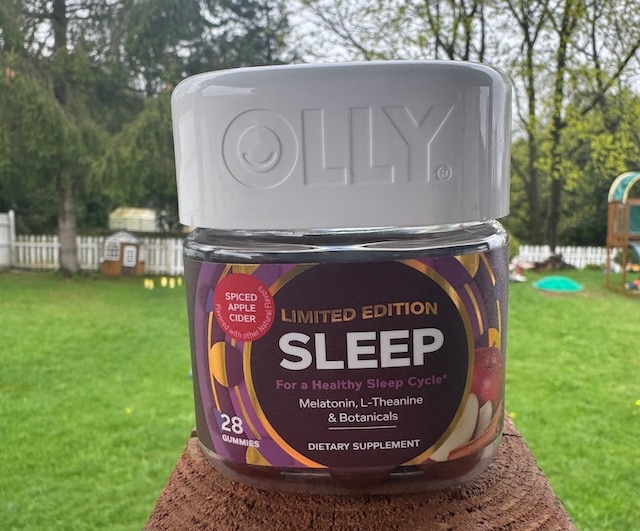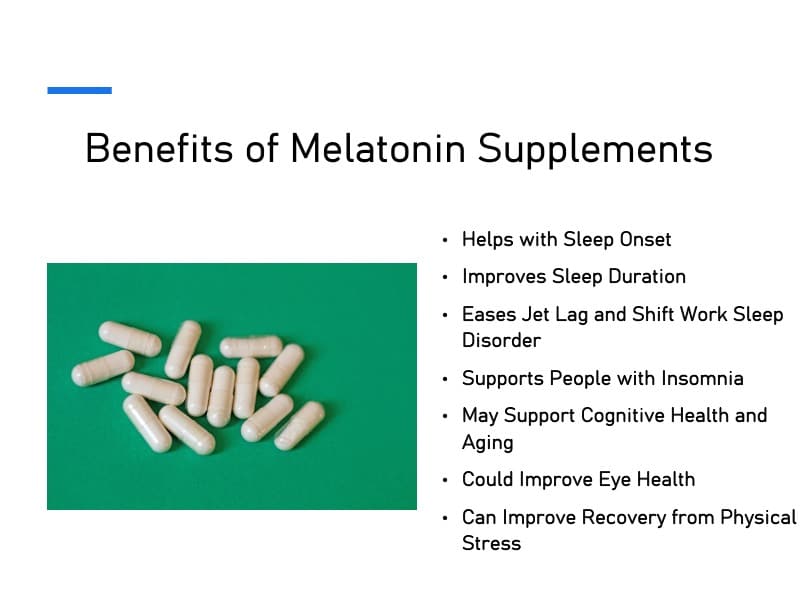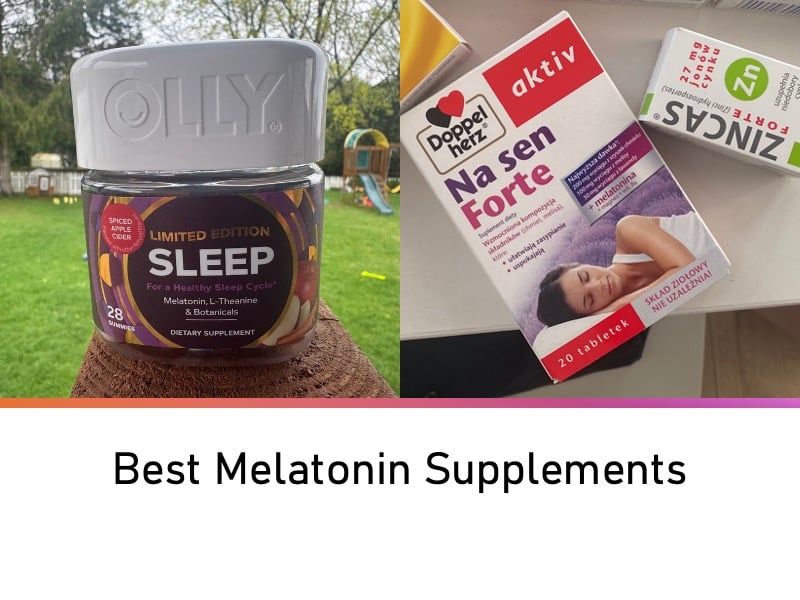Melatonin: What it Is, Benefits, Supplement Safety & More
Melatonin plays a crucial role in regulating your body’s natural sleep-wake cycle, and melatonin supplements have become one of the most popular natural sleep aid options for people struggling with sleep issues.
Whether dealing with insomnia, jet lag, or shift work disorder, many turn to melatonin as a natural way to restore healthy sleep patterns.
While melatonin can offer meaningful short-term benefits, understanding how it works, the potential risks of long-term use, and how to choose high-quality melatonin supplements is essential for making an informed decision.
As research continues to explore melatonin’s effects on aging, cognitive health, and overall well-being, this guide provides an evidence-based look at the benefits of melatonin, safety considerations, effective alternatives, and what you need to know before making melatonin part of your nightly routine (Givler et al., 2023).
What is Melatonin?

Melatonin is a hormone naturally produced by the pineal gland in the brain, primarily responsible for regulating the body’s circadian rhythm, also known as the sleep-wake cycle.
Melatonin levels rise in response to darkness, helping signal to the body that it’s time to prepare for sleep, and decrease in the morning with exposure to light.
Melatonin supplements are designed to mimic this natural process, providing extra support for individuals struggling with sleep disturbances such as insomnia, jet lag, or shift work sleep disorder.
Available over-the-counter in many countries like the United States, melatonin supplements come in a variety of forms, including tablets, gummies, sublingual sprays, and liquid drops.
Because melatonin is classified as a dietary supplement in the U.S., it is not regulated as strictly as prescription medications.
This means that the potency, purity, and overall quality of melatonin products can vary significantly between brands, making it important to choose a reputable manufacturer when adding melatonin to your sleep routine (Erland & Saxena, 2017).
How to Increase Natural Melatonin Production
While melatonin supplements are helpful for short-term sleep issues, supporting your body’s natural melatonin production is the most sustainable strategy for long-term sleep health.
Several simple, science-backed habits can help increase natural melatonin production and improve your sleep-wake rhythm without relying solely on supplements.
Prioritize Exposure to Natural Light During the Day
Bright, natural light exposure, especially in the morning, helps regulate your circadian rhythm and supports healthy nighttime melatonin production.
Aim to spend at least 30 minutes outside each day, ideally in the morning sunlight, to reinforce your body’s internal clock (Tordjman et al., 2017).
Limit Artificial Light at Night
Blue light from phones, tablets, and LED lights suppresses melatonin release.
Reducing screen time at least one to two hours before bed, using blue light blocking glasses, or switching to warm, dim lighting in the evening can naturally boost melatonin secretion.
Create a Consistent Sleep Schedule
Going to bed and waking up at the same times every day, even on weekends, helps train your brain to release melatonin predictably.
Irregular sleep schedules confuse your circadian rhythm and reduce natural melatonin production over time.
Optimize Evening Environment for Darkness
Melatonin production is tightly linked to darkness.
Creating a dark, cool, and quiet bedroom environment, using blackout curtains, and minimizing indoor lighting after sunset can encourage the body’s natural melatonin surge at night.
Eat Foods Rich in Melatonin Precursors
Certain foods naturally support melatonin production.
Eating foods rich in tryptophan, magnesium, and vitamin B6, such as turkey, almonds, oats, bananas, and leafy greens, can increase your body’s ability to produce melatonin (Hardeland, 2012).
Support Gut Health
The gut microbiome plays a surprisingly important role in melatonin synthesis. Healthy gut bacteria help regulate serotonin, the precursor to melatonin.
Eating a fiber-rich diet, incorporating fermented foods, and avoiding excessive antibiotic use can improve gut health and, indirectly, melatonin production (Carrillo-Vico et al., 2013).
Benefits of Melatonin Supplements

Melatonin supplements are best known for helping people fall asleep faster, but their benefits extend well beyond just sleep induction.
Melatonin plays a complex role in regulating biological rhythms, protecting brain health, and supporting overall recovery from physical and cognitive stress.
While melatonin supplements are not a cure-all, research suggests they may provide targeted benefits for individuals facing a variety of sleep-related and neurological challenges.
Here’s a deeper look at the scientifically supported benefits of melatonin supplements:
Helps with Sleep Onset
One of the most well-known benefits of melatonin supplements is their ability to reduce the time it takes to fall asleep.
By mimicking the body’s natural melatonin production, these supplements help regulate your circadian rhythm, especially when it’s disrupted by factors like traveling across time zones or working late-night shifts.
Improves Sleep Duration
For individuals who wake up frequently during the night, sustained-release melatonin supplements can help improve sleep duration.
Research shows that melatonin may be especially effective in improving sleep continuity in people with delayed sleep phase syndrome and other circadian rhythm disorders (Buscemi et al., 2005).
Eases Jet Lag and Shift Work Sleep Disorder
Melatonin supplements are often used to help reset the internal body clock after eastward travel (jet lag), or shift work.
By supplementing melatonin strategically before sleep in the new time zone, the adjustment period can be shortened, resulting in better sleep quality and daytime alertness.
Supports People with Insomnia
Melatonin can be a useful tool for individuals dealing with insomnia, particularly for those who have trouble falling asleep.
Research shows that melatonin reduces sleep onset latency without the dependency risks associated with pharmaceutical sleep aids.
May Support Cognitive Health and Aging
Emerging research suggests that melatonin could play a neuroprotective role by reducing oxidative stress and inflammation in the brain.
Some studies even propose that long-term melatonin use may support cognitive performance in individuals with mild cognitive impairment (Giménez et al., 2022; Sumsuzzman et al., 2021).
Could Improve Eye Health
Melatonin possesses strong antioxidant properties that may protect retinal cells from oxidative damage.
This has led researchers to explore its potential role in supporting eye health, particularly in conditions like age-related macular degeneration (Hardeland, 2012).
Can Improve Recovery from Physical Stress
Melatonin supplementation may help improve recovery from intense physical exertion by reducing oxidative stress and promoting better sleep quality, which is critical for muscle repair and hormonal balance.
Side Effects & Precautions
Melatonin is generally well-tolerated, especially when taken at low to moderate doses (around 1–5 mg per night).
However, some people may experience mild side effects such as headaches, dizziness, nausea, vivid dreams, or next-day grogginess.
These symptoms usually resolve once melatonin use is stopped.
More serious concerns, although rare, include potential interactions with medications like blood thinners, immunosuppressants, and blood pressure medications.
High doses may also cause hormonal changes, particularly in children, which has raised concerns about delayed puberty with long-term use.
Because melatonin supplements are not strictly regulated in the United States, the actual content can vary between brands and products.
Choosing reputable, third-party-tested supplements helps minimize the risk of contaminants or dosing inaccuracies.
If you are pregnant, breastfeeding, managing a chronic condition, or taking medications, consult with a healthcare professional before using melatonin.
It’s also wise to start with the lowest effective dose and monitor your response carefully to avoid unnecessary side effects.
Best Melatonin Supplements (2025)

Choosing a high-quality melatonin supplement is critical because product quality, dosage accuracy, and supporting ingredients can vary widely.
Over the years, I’ve tested several options to find a balance between effectiveness, safety, and natural support for restful sleep.
One of my all-time favorite melatonin supplements is na Sen Forte, which is available in Poland and some parts of Europe.
It combines melatonin with natural sleep aids like lemon balm and lavender, similar to how OLLY Sleep Gummies blend melatonin with other calming botanicals.
With that being said, here are two melatonin supplements I personally trust and recommend:
OLLY Sleep Gummies (My Favorite Choice)
After trying multiple melatonin supplements, OLLY Sleep Gummies have become my go-to option for winding down at night.
Although the standard serving size is two gummies (providing 3 mg of melatonin), I personally take only one gummy per night.
This gives me a lower dose of 1.5 mg of melatonin, which I find to be plenty effective, especially combined with the other natural sleep-promoting ingredients in this formula.
Each gummy not only contains melatonin but also includes L-Theanine, Chamomile, Passionflower, and Lemon Balm, which are botanicals that help calm the mind, ease tension, and support a healthy sleep cycle.
I especially appreciate this broader approach because it supports sleep through multiple pathways, not just melatonin supplementation alone.
The flavors make them enjoyable, and the formula is gluten-free with no synthetic flavors or colors.
I recommend OLLY Sleep Gummies to anyone who wants a gentle, well-rounded sleep supplement that tastes great and works naturally with the body’s rhythms.
Last update on 2025-11-12 / This article includes affiliate links/Images via Amazon Product Advertising API. I may earn commissions on purchases made through these links.
Nature Made Melatonin (3mg)
If you prefer a straightforward melatonin supplement without additional botanicals, Nature Made Melatonin 3mg is a reliable and trusted choice.
This product delivers a clean 3 mg dose of melatonin per tablet, is drug-free, non-habit-forming, and gluten-free, making it a safe option for occasional sleep support.
Nature Made is known for strict quality control and third-party testing, which offers peace of mind when choosing a supplement you’ll take regularly.
For those who are just starting with melatonin or prefer to stack it with other natural sleep aids like magnesium or zinc, Nature Made is an excellent foundation.
Last update on 2025-11-12 / This article includes affiliate links/Images via Amazon Product Advertising API. I may earn commissions on purchases made through these links.
Alternative to Melatonin Supplements for Sleep
For those concerned about long-term melatonin use, there are alternative methods to improve sleep quality.
These options can enhance your sleep cycle naturally without relying on hormone-based supplements.
Zinc and Magnesium
Magnesium and zinc play essential roles in regulating sleep. Magnesium helps calm the nervous system and relax muscles, while zinc supports immune function and melatonin production.
Taking zinc before sleep can help improve sleep quality by enhancing the body’s natural melatonin production.
Combining melatonin, zinc, and magnesium offers a more comprehensive long-term strategy than melatonin alone.
A good option is combining a separate melatonin supplement with Rootcha’s Magnesium and Zinc.
Last update on 2025-11-12 / This article includes affiliate links/Images via Amazon Product Advertising API. I may earn commissions on purchases made through these links.
As a standalone magnesium supplement, my favorite option is Qunol Magnesium Glycinate:
Last update on 2025-11-12 / This article includes affiliate links/Images via Amazon Product Advertising API. I may earn commissions on purchases made through these links.
Raw Botanics Rest
As someone who has tried both melatonin and melatonin-free sleep supplements, I found The Raw Botanics Co. REST & Refresh to be an excellent melatonin-free natural sleep aid.
Raw Botanics REST & Refresh uniquely combines adaptogens, cannabinoids, and calming botanicals to support relaxation and encourage deeper, restorative sleep, without the grogginess, hormonal disruption, or potential dependency associated with melatonin supplements.
>> Use the Raw Botanics coupon code AFF30 for 30% off your order at RawBotanics.com.
Final Thoughts: Should You Take Melatonin Supplements?
Melatonin supplements can be effective for short-term sleep disturbances like jet lag, shift work, and temporary insomnia, but they are not ideal for long-term use.
While natural melatonin levels decline with age, and supplementation may help older adults, quality and dosage inconsistencies across brands make it important to choose reputable products.
Most people tolerate melatonin well at low doses, although mild side effects such as headaches, dizziness, or next-day grogginess can occur, and potential interactions with medications should not be overlooked.
Research on the safety of long-term daily use remains limited, and healthcare experts generally recommend caution against prolonged reliance.
Building better sleep habits, like maintaining a consistent bedtime, practicing progressive muscle relaxation techniques, and limiting evening screen time, can naturally increase melatonin production and support sustainable sleep health.
Supplements like magnesium and zinc can also complement a healthy sleep routine without the risks associated with chronic melatonin use.
While melatonin can serve as a valuable short-term reset, lasting improvements in sleep quality are best achieved through natural lifestyle changes.
Always consult with a healthcare provider to determine if melatonin is the right option for your individual needs.
Frequently Asked Questions
If you’re considering using melatonin or simply curious about how it works, you’re not alone.
Below are answers to some of the most frequently asked questions about melatonin supplements, their effectiveness, safety, and best practices for use.
This website does not provide medical advice. This website site does contain affiliate links, and purchases may earn a commission.
Read my Medical Disclaimer, Review Disclaimer, and Publishing Policies for more details. Use of this site indicates acceptance of these terms.







